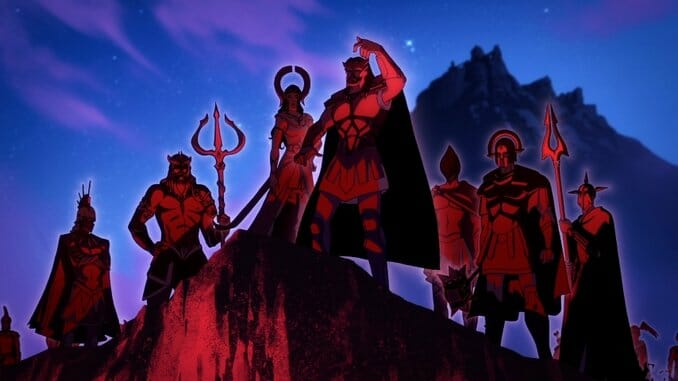Netflix’s Blood of Zeus Is a Gloriously Visceral Spin on Greek Mythology
Photos via Netflix
When you stop to think about it, the casual familiarity of the public with Greek gods worshiped thousands of years ago may seem quite a remarkable thing. It’s an impressive example of staying power to think that the average person on the street could likely cite a fact or two about Zeus, an omnipotent skyfather whose image has been familiar for some 5,000 years. Upon closer inspection, however, one can recognize that the pantheon of Greek immortals—the mythology surrounding them, their powers and exploits, their superhuman depictions—is part of the same story that man has always told, and always will tell. What are the superheroes of the Marvel Cinematic Universe, if not their own pantheon of gods and goddesses?
It’s no surprise then that Netflix’s Blood of Zeus finds fertile source material for its animated action epic, all of it vaguely familiar in the way that comic book stories usually are. Most savvy anime viewers were likely taught about Greek mythology at some point, after all, or have seen it depicted via endless iterations of Hercules or the likes of Clash of the Titans. The settings and characters already feel comfortably familiar, but they are endlessly malleable, allowing Blood of Zeus to function like a freeform anthology of ancient Greek myth and modern invention. There are details here culled from every discrete corner of mythology, fused into a composite adventure, and damn if it doesn’t still seem vivacious and alive.
Much of that vitality is derived straight from the spectacular animation, which is an immediate strength for Blood of Zeus. The production company here is Austin-based Powerhouse Animation, the same studio that brought us Netflix’s lushly beautiful Castlevania, which I’d previously named as the best videogame adaptation of all time. And indeed, it feels very much like a product of the same artistic minds, down to character models that occasionally look just a bit too familiar—protagonist Heron in particular feels like a short-haired stand-in for half vampire Alucard, but there’s obviously a fine line between “a consistent art style” and an overused one. More important is the fact that the settings and action of Blood of Zeus feel fresh, while being imbued with the same bombastic bloodiness of Castlevania.
And my, do those action scenes largely live up to the high bar that Powerhouse Animation previously set. These gods and goddesses get positively grisly on a regular basis, and there are moments of explicit violence that occasionally feel even more line-crossing than anything in Castlevania, especially because it’s often the depiction of callous atrocities being committed by humanity against itself, rather than vampires who see humanity as troublesome cattle. Even as a jaded horror geek, there were some spectacles of gore I found myself wincing at, and I say that as a compliment.
-

-

-

-

-

-

-

-

-

-

-

-

-

-

-

-

-

-

-

-

-

-

-

-

-

-

-

-

-

-

-

-

-

-

-

-

-

-

-

-








































